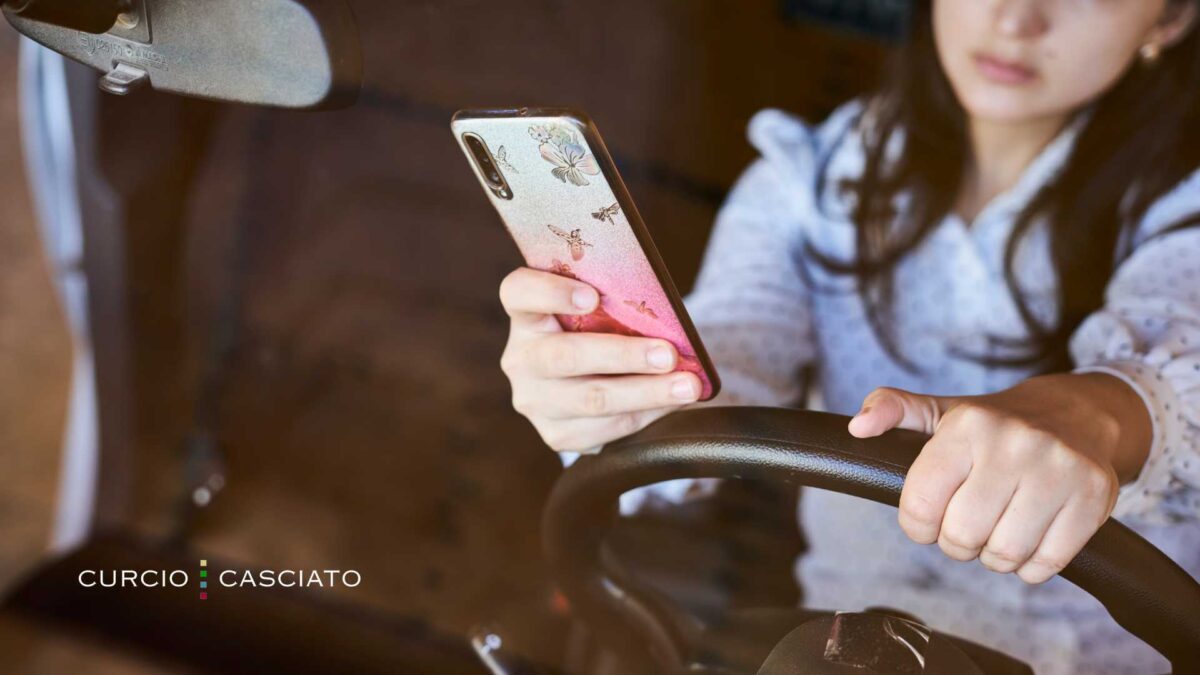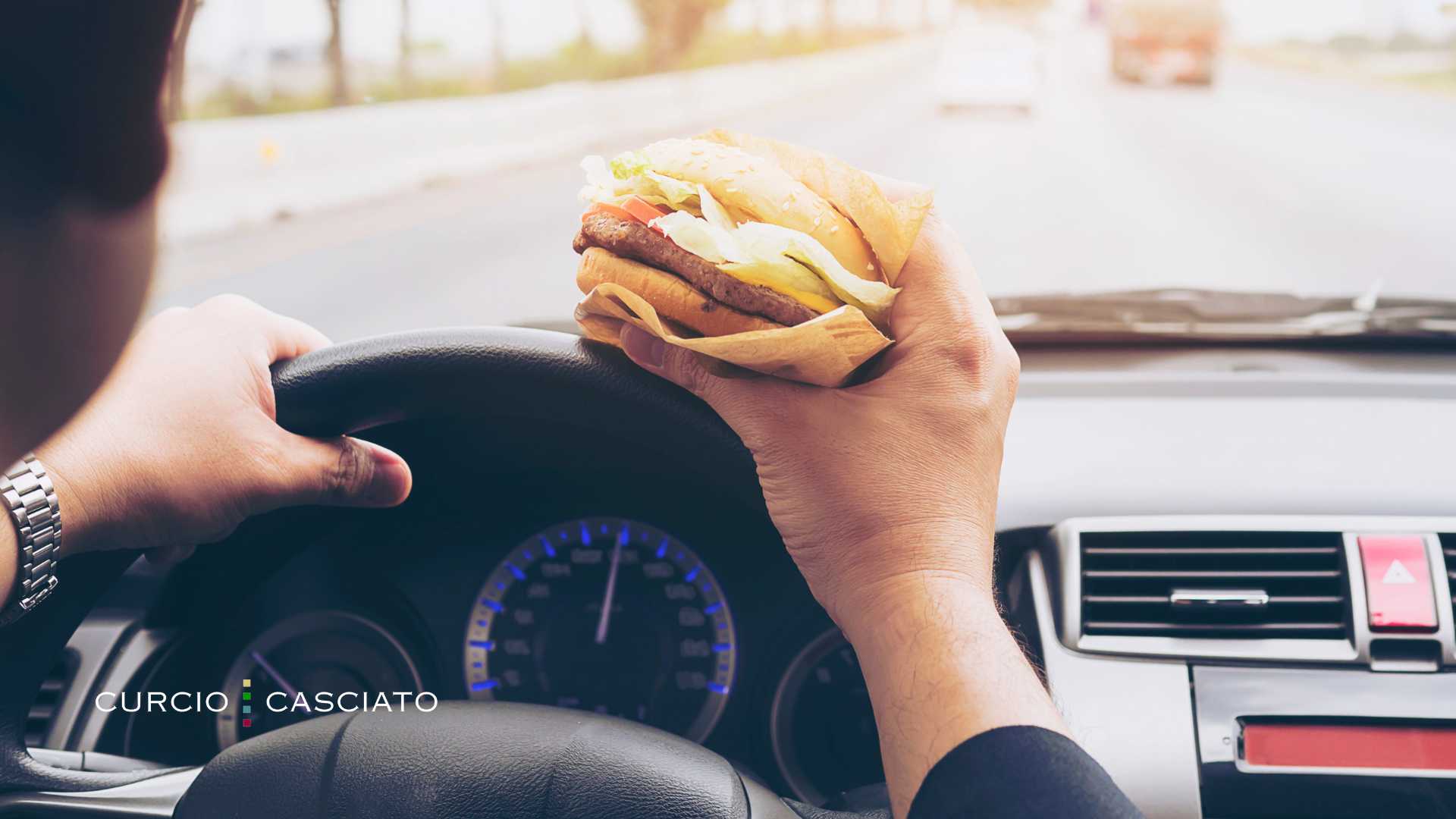CHICAGO DISTRACTED DRIVING ACCIDENT LAWYER
PRACTICE AREAS
The Chicago distracted driving accident lawyer team at Curcio & Casciato is committed to holding distracted drivers accountable. Whether you were hit by a driver who was texting and driving or injured in another type of distracted driving car accident, our law firm’s Chicago distracted driving attorneys have the skills and resources needed to handle the most complex distracted driving accident cases.
Our personal injury attorneys in Chicago, IL, provide legal representation on a contingency fee basis. We conduct thorough investigations using police reports, cell phone records, and other evidence, if needed, to prove that the at-fault driver was distracted at the time of the accident. We’re skilled at negotiating with insurance adjusters and are prepared to take the case to civil court if the insurance company fails to provide a fair settlement offer.
If you sustained serious injuries or lost a loved one, call 312-321-1111 or contact us online to schedule a free consultation to discuss your legal options with an experienced distracted driving attorney from our law office today.

What is the Definition of Distracted Driving in Illinois?
Distracted driving is anything that diverts attention behind the wheel. Here are the main types of driver distractions in Chicago:
- Visual Distractions: When a driver’s eyes are off the road, such as looking at other passengers or in the back seat, this is a visual distraction. Just a few seconds of the driver’s eyes being diverted at fast speeds can equal the length of an entire football field blindfolded. This is why most laws state a football field’s length between vehicles is necessary to avoid rear-end collision liability.
- Manual Distractions: When the driver’s hands are off the wheel, this is a manual distraction. A driver’s hand being off the wheel can easily lead to a collision.
- Cognitive Distractions: When a person’s mind is elsewhere behind the wheel, this is called cognitive distraction in Illinois.
Our experienced distracted driving attorneys in Chicago will gather evidence, such as police reports, cell phone records, and other evidence to prove the at-fault driver was negligent. We negotiate with insurance companies to recover damages for medical costs, lost wages, and emotional distress. If you or a loved one suffered serious injuries in a distracted driving car accident, contact a Chicago distracted driving accident lawyer from our law firm to explore your legal options.
Cases our Chicago Distracted Driving Car Accident Lawyers Handle
Our distracted driving accident attorneys in Chicago handle many cases where the other driver wasn’t paying attention, whether from texting, getting something from the back seat, or other acts that divert attention. The Chicago distracted driving accident lawyer group at our law firm commonly handles personal injury lawsuits involving the following accidents caused by distracted driving.

Trucking Distracted Driving Accidents
Trucking distracted driving accidents in Chicago are often caused by text messaging and fatigue from exceeding Illinois truck driver hours regulations. These crashes can lead to severe injuries, including spine damage and traumatic brain injuries, leaving victims with mounting medical costs. An experienced truck accident lawyer in Chicago will conduct a thorough investigation and file a personal injury claim against the other driver and their insurance company to help secure fair financial compensation.
Intersection Accidents
Distracted driving car crashes caused by drivers not paying attention at intersections are a leading cause of serious collisions. Cell phone use, running a red light, or failing to yield, often results in dangerous T-bone collisions. Victims may suffer severe back, knee, or traumatic brain injuries and have the right to pursue a claim for compensation. A skilled Chicago t-bone accident lawyer can help prove negligence and fight for the maximum compensation victims deserve.
Distracted Driving Construction Zone Accidents
Our Chicago distracted driving accident lawyer group understands the dangers of distracted driving car accidents in construction zones. Crashes often result in serious injuries, leaving victims with costly medical expenses and vehicle damage. Legal representation from our law firm’s Chicago construction site accident lawyer team is crucial for holding distracted drivers accountable and securing compensation for victims.
School Bus Hit by Distracted Driver
School bus accidents caused by distracted drivers can lead to serious injuries for students. Many crashes happen due to cell phone use, where the other driver fails to stop or yield. Our Chicago school bus accident lawyer team is experienced in handling distracted driving accident cases and can help file a personal injury claim to recover damages.
Pedestrian Hit by Distracted Driver
Chicago distracted driving accident attorneys understand the devastating impact of car accidents involving pedestrians. A pedestrian accident caused by a distracted driver can leave victims severely injured, facing costly medical bills and long recovery times. A skilled pedestrian injury lawyer in Chicago can help clients file a personal injury lawsuit.
Distracted and Drunk Driving
A Chicago distracted driving accident attorney team knows how an accident caused by a distracted driver or drunk driving can lead to significant injuries, such as spinal cord injuries and traumatic brain injuries. A dedicated Chicago DUI accident lawyer from our law firm can provide skilled assistance for insurance adjuster negotiations and help clients secure fair settlement offers for their losses.
Distracted Driving Deaths
Our distracted driving accident lawyers in Chicago understand that common distractions can quickly cause fatal car accidents, leaving families devastated. When negligence leads to a fatal crash, surviving family members may have the right to seek justice and compensation. A compassionate Chicago wrongful death car accident lawyer can help families navigate the legal process and hold the responsible party accountable.

Distracted Driving Law Illinois
The Chicago distracted driving accident lawyers at our law firm have a deep understanding of Illinois traffic laws. Below are key aspects:
- Handheld Device Ban: Drivers are prohibited from using handheld electronic communication devices while operating a vehicle. This is meant to minimize manual distractions.
- Hands-Free Requirement: In Illinois, drivers aged 19 and older may use hands-free or Bluetooth technology. These technologies help reduce manual distractions.
- School Zones: Phone use is strictly prohibited in school zones, regardless of whether a hands-free device is used.
- Construction Zones: Phone use is also prohibited in highway construction zones, regardless of whether a hands-free device is used.
- Headset and Earphone Restrictions: Illinois law prohibits the use of headsets while driving, except for single-sided earpieces used with a phone.
If you or a family member sustained significant injuries because of text messaging or another form of driver distraction, a car crash lawyer in Chicago from our law firm can negotiate with insurance companies to recover compensation for medical expenses, lost wages, and other financial losses caused by the other driver.
Contact our Chicago distracted driving accident attorney team for a free consultation.
How a Chicago Distracted Driving Lawyer Can Help
Our law firm’s Chicago distracted driving accident lawyer team provides skilled legal guidance for those injured in car crashes caused by distracted drivers.
Our distracted driving accident attorneys in Chicago investigate collisions and gather evidence, such as official reports, phone records, and witness statements, to prove the other driver was texting or engaged in other distractions right before the crash. We also negotiate with insurance companies to help clients secure compensation for vehicle repairs, medical costs, and damages caused by the other driver.
If you’ve been injured, contact a Chicago distracted driving accident attorney at our law firm to discuss your case.

Chicago Distracted Driving Accident Attorney
If you or a loved one has been injured, our Chicago distracted driving car accident lawyer team can help. We handle personal injury claims on a contingency fee basis, meaning clients don’t owe any legal fees unless we secure fair car crash settlements or jury awards that cover medical bills, lost income, vehicle repairs, and other related losses.
Call 312-321-1111 for a free consultation with our distracted driving accident attorneys in Chicago to discuss your personal injury case.


